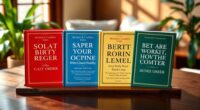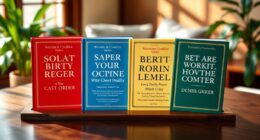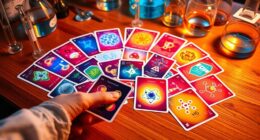If you’re wondering which learning hacks work best for sensing or intuiting, it helps to know your natural style. Sensing learners thrive with hands-on activities, real-world examples, and step-by-step guides, while intuitives benefit from creative thinking, big-picture insights, and exploring patterns. Applying methods aligned with your dominant preference makes learning more effective and enjoyable. Keep exploring, and you’ll discover strategies tailored just for you that maximize your understanding and motivation.
Key Takeaways
- Sensing learners benefit from structured, step-by-step learning tools like checklists and practical exercises.
- Intuitive learners excel with brainstorming, abstract concepts, and connecting ideas for deeper understanding.
- Visual aids like diagrams and charts enhance retention for sensing types, while mind-mapping sparks creativity for intuitives.
- Real-world projects and hands-on activities reinforce learning best for sensing, whereas exploring theories suits intuitives.
- Tailoring study methods to your dominant style boosts efficiency, engagement, and long-term retention.

Understanding the difference between sensing and intuiting can considerably improve how you perceive and process information. When you recognize whether you rely more on concrete details or abstract ideas, you can tailor your learning strategies to suit your natural preferences. Sensing involves focusing on tangible facts, practical applications, and real-world details. If you’re a sensing type, you tend to prefer learning through direct experience, hands-on activities, and detailed instructions. This approach makes it easier for you to absorb information that has immediate relevance, such as step-by-step guides, checklists, or data-driven insights. Conversely, intuiting is about seeing the bigger picture, connecting ideas, and exploring possibilities beyond what’s immediately visible. If you lean toward intuition, you often thrive on creative insights and conceptual frameworks, finding patterns and underlying meanings that others might overlook.
Knowing your dominant approach can profoundly influence how you develop effective learning hacks. For sensing individuals, practical applications are key. You benefit from strategies that involve applying knowledge directly to real-life situations. For instance, when learning a new skill or concept, try to incorporate projects or case studies that demonstrate how the information functions in real-world contexts. This not only reinforces your understanding but also keeps you engaged through tangible results. You’ll find that breaking down complex topics into manageable, practical steps makes learning more effective and less overwhelming. Additionally, using tools such as diagrams, charts, and checklists helps you organize facts systematically, aligning with your preference for concrete details. Incorporating visual aids can further enhance your comprehension by making information more accessible and easier to remember.
Practical applications and real-world projects enhance learning for sensing types.
On the other side, if you’re an intuitive learner, you’ll find that creative insights fuel your understanding. You thrive when you can explore ideas freely, make connections, and envision future possibilities. Learning hacks that work for you involve engaging with abstract concepts, brainstorming sessions, and mind-mapping techniques. These methods help you synthesize information and generate innovative ideas. You might also benefit from discussing theories or imagining how concepts could evolve, which stimulates your natural curiosity and desire for deeper understanding. By focusing on the bigger picture and linking ideas, you can develop a richer, more integrated grasp of complex topics. Whether you’re designing new projects or delving into theoretical frameworks, harnessing your intuitive strengths allows you to see patterns others might miss.
Ultimately, understanding whether you’re more sensing or intuitive provides a practical advantage. It helps you choose study methods that resonate with your thinking style, making learning more efficient and enjoyable. Recognizing your natural inclinations enables you to balance practical applications with creative insights, creating a personalized approach that unlocks your full potential.
Frequently Asked Questions
How Do Sensing and Intuiting Preferences Influence Team Collaboration?
Your sensing and intuiting preferences shape how you approach team collaboration. Sensing types focus on details, fostering clear team communication and reliable conflict resolution. Intuiting types prefer big-picture thinking, promoting creative ideas and innovative solutions. Understanding these differences helps you adapt communication styles, reduce misunderstandings, and resolve conflicts more effectively. Embracing both perspectives enhances team synergy, making collaboration smoother and more productive for everyone involved.
Can Sensing and Intuiting Learning Styles Change Over Time?
While it’s often said that personality adaptability shapes us, your sensing and intuiting learning styles can indeed evolve over time. As you gain new experiences and insights, your learning style may shift, reflecting a natural learning style evolution. Embracing this fluidity allows you to adapt more effectively, leveraging different strengths as needed. So, yes, your preferences aren’t fixed, and ongoing growth can lead to meaningful changes in how you learn best.
Which Learning Hacks Benefit Both Sensing and Intuiting Learners Equally?
You’ll find that multisensory techniques and experiential learning benefit both sensing and intuiting learners equally. By engaging multiple senses, you boost retention and understanding, regardless of your style. Hands-on activities, real-world applications, and visual aids help you stay focused and retain information better. These hacks create dynamic learning experiences, ensuring everyone, whether sensing or intuiting, can enhance their skills effectively through active participation and varied stimuli.
Are There Specific Subjects Better Suited for Sensing or Intuiting Learners?
When considering subject-specific preferences, you’ll find that sensing learners thrive with concrete, detail-oriented content, while intuiting learners excel with abstract, big-picture ideas. Content adaptability is key—tailoring your approach to each subject’s nature helps you learn more effectively. You should focus on using concrete examples for sensing types and exploring theories or concepts for intuiting types, ensuring your study methods match the subject’s demands.
How Can Educators Tailor Teaching Methods for Sensing Versus Intuiting Students?
Imagine guiding a traveler through a vibrant market or a vast map—each needs different tools. To reach sensing students, you should emphasize sensory engagement, using hands-on activities and real-world examples. For intuiting students, focus on fostering conceptual understanding through big-picture discussions and creative projects. Tailoring your teaching methods helps both types thrive, making learning more dynamic and effective for everyone.
Conclusion
Ultimately, understanding whether you’re sensing or intuiting helps you tailor your learning hacks effectively. Embrace the method that resonates most—whether soaking up details like a diligent scribe or dreaming big like a Renaissance thinker. Remember, as the Bard once mused, “All the world’s a stage,” so adapt your approach to suit your unique rhythm. With this insight, you’ll navigate your educational journey with greater ease, turning every challenge into a veritable voyage of discovery.
Felicity, our Author, pens in-depth articles and guides that delve into the heart of personal discovery. Her narrative-driven approach weaves together theory, practice, and personal anecdotes, making the journey of self-exploration both relatable and inspiring. Felicity’s contributions help illuminate the path for those seeking a deeper understanding of themselves and their relationships.









